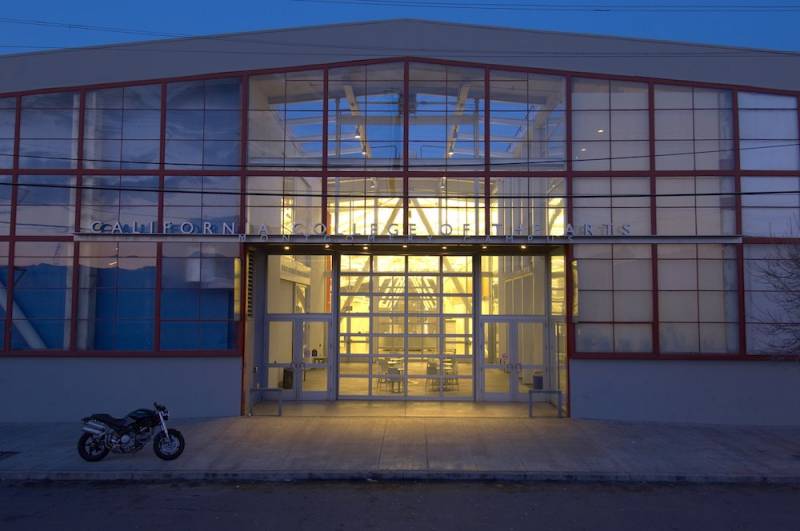Gray said she’s fortunate to have scholarships and grants, and was more motivated to launch the petition by her concern for peers paying tuition out of pocket. Still, Gray depends on onsite access to digital tools she doesn’t have at home in Oakland, and knows people in fields such as ceramics and glass-blowing who’ve been forced to effectively halt important projects. “I know if I was a 3D animation student my software licenses would cost like $1,000 right now,” Gray said. “That’s part of your tuition.” She added, “I do love CCA—we just want every dollar’s worth.”
“We’re aware of the petition, and of similar petitions,” Brian Maxey, a CCA spokesperson, said in a statement Wednesday. “Our primary focus is on the safety and well-being of our community, followed by ensuring our students are able to continue their learning in ways that, while different than what any of us expected, still fulfill the requirements and authentic learning outcomes for them to receive credit for their classes and continue progress toward their degrees.”
On Thursday, after this article was published, CCA president Stephen Beal and provost Tammy Rae Carland released a statement saying students who move out of the residence halls for the rest of the semester will receive a credit for their housing costs prorated to Tuesday, March 17.
CCA is also soliciting donations to a student emergency fund, saying in an announcement Thursday that many students have lost off-campus part-time jobs. The fund, administered through the CCA Cares Program, is intended to address food insecurity, household needs and health and wellness support, the college announced.
“Students are 100-percent justified in demanding to get money back for education they’re not able to receive,” David Skolnick, an assistant professor in the writing and literature department at CCA, said in an interview. “At the same time, if everyone got their tuition back it’d mean the school goes bankrupt and we all lose our jobs. … In this situation, everyone’s losing right now.”
California College of the Arts, founded in the East Bay in 1907, currently enrolls some 1,850 undergraduate and graduate students of art, architecture and design. It also operates the Wattis Institute for the Contemporary Arts. Currently the college spans two campuses in Oakland and San Francisco, but is in the process of consolidating, or “unifying,” in administration parlance, around its housing and instructional facilities at the foot of Potrero Hill.
Underlying the petition is long-mounting frustration with the growing cost of higher education, especially at private colleges in expensive regions such as CCA, where first-year undergraduate tuition and fees run $76,671. There’s also the debt burden that students bring to an uncertain job market. “This is an expensive college, and even in a normal year students don’t necessarily feel like they’re getting their money’s worth,” said Yuri Knighten, 25, a recent illustration graduate who’s still active with CCA’s independent student union and has helped circulate Gray’s petition.
Knighten cautioned, however, that CCA students should balance their call for refunds with concern for the financial stability of college faculty and staff, who have unionized in recent years over concerns with a rising cost of living and the ongoing campus consolidation in San Francisco. For now, according to Maxey and union members, staff who cannot from home and whose presence isn’t necessary on campus will continue to receive compensation. “Having been involved with the staff and adjunction union fights, I’m thinking of how to be in solidarity,” Knighten said.
A petition launched last week by Rosie Oganesian, a freshman at University of California Irvine, similarly calls for housing and meal plan refunds and tuition reductions. It has since been amended to include public colleges statewide, and has more than 7,000 signatures. UC leadership has ruled out tuition refunds, saying grades from online classes count towards the same diploma, while leaving decisions about some fees to individual college administrations.
UC faculty are also voicing concern about the digital pivot. “Most of us were not trained or hired to teach online courses, and online courses are not what the students enrolled and paid for,” reads an open letter, published Monday, with signatures from UC educators and supporters. (The letter firstly criticizes the recent firing of striking graduate students.) “The mandate is clearly to engage in ersatz education for the sake of sustaining a fiction of continuity.”
Class meetings are paused this week to allow faculty time to develop alternative coursework and learn new tools for remote teaching. “Zoom meetings to learn to use Zoom,” as Skolnick, the writing professor, put it. “No one believes this is a comparable learning experience,” he continued, noting the campus shutdown will most acutely affect students with a studio-based practice. “Still we now have to focus on the most basic learning outcomes, like a coherent four-page academic essay. … Other things, like oral presentation, will fall by the wayside.”


